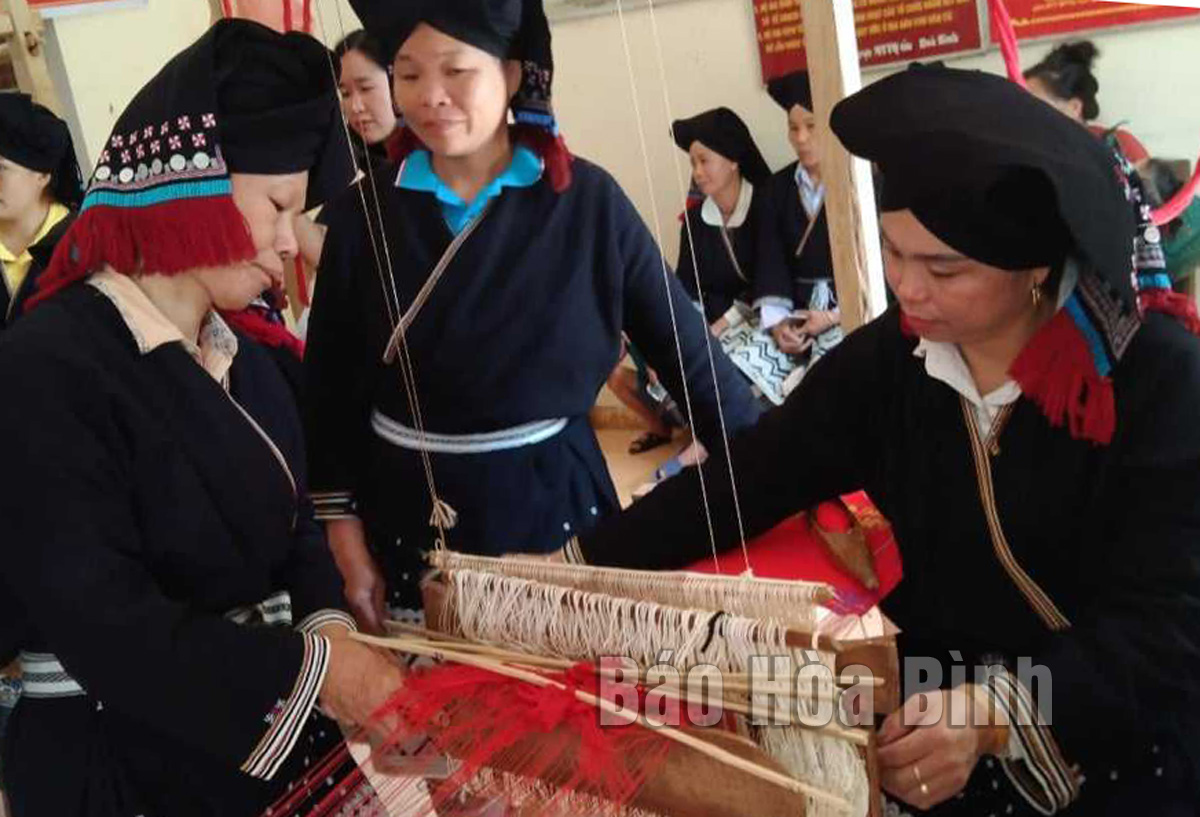
(HBO) - Da Bac, the most difficult highland district of Hoa Binh, is home to over 59,000 people, with ethnic minorities accounting for nearly 90% of the population. Implementing national target programmes, the district has established a steering committee to assign tasks and plan the allocation of fundings for various local projects.

Women in Toan Son commune, Da Bac, learn to revive the traditional weaving craft of the Dao people.
The implementation of projects under the national target programmes has so far brought about positive changes to the lives of local people. The state's investment in infrastructure such as electricity, roads, schools, and medical stations have generated driving forces for the district's socio-economic development.
Bui Thi Chi from Ke hamlet, Hien Luong commune, said: "In the past, my children had to work far away. Since the state supported us in running homestay services, my family has focused on investment and learned from experiences to build our Huu Thao homestay. My children no longer have to work away from home, and our family secures a stable income. Tourism also contributes to preserving the local culture."
According to Luong Van Vinh, head of Trung Tam hamlet, Trung Thanh commune, allowed by the authorities, the Hoa Binh Agriculture Cooperative has signed a 20-year contract to supply raw materials to An Phuoc Group's cotton and yarn factory, which is located in Thach Thanh district, Thanh Hoa province. The cooperative chose the Trung Thanh to cultivate ramie. After two years of implementation, the plant has grown well, with many local households switching from less productive crops to ramie cultivation for more stable income.
Over the recent years, the state's investment programmes and projects in Da Bac have been done timely and effective, with their set targets achieved and overfulfilled. The average per capita income increased from 29.5 million VND (1,243 USD) in 2020 to 37.5 million VND in 2022; the poverty rate decreased from 41.56% in 2021 to 34.94% in 2022; the rate of trained labours reached 61.78% in 2022; and the production value rose from 7.14% in 2021 to 9.2% in 2022. The economic structure shifted in the right direction, with agro-forestry-fisheries accounting for 35.2%, industry-handicraft-construction 21.1%, and trade-tourism-services at 43.7%.
Currently, operating in the district are over 120 businesses and 44 agricultural cooperatives. Industrial-oriented farming models are gradually replacing small-scale methods, while high-value economic goods have been produced on a broader scale./.
Playing a key role in Hoa Binh province’s economic development, Luong Son district has been focusing on science and technology development, innovation, and digital transformation.
Identifying the application of online public services as a key step in administrative procedure reform and e-government building, Kim Boi district has proactively provided services and supported residents and businesses in accessing and utilising full-process online public services promptly and efficiently. The locality aims to lift the rate of end-to-end online public services to over 90%, with all officials and civil servants handling tasks in the digital environment.
Nguyen Anh Tuyet, hailing from a family steeped in the ancient art of herbal medicine, is transforming local medicinal herbs into high-value concentrated extracts, elevating their worth and healing potential.
Nguyen Phi Long, an alternate member of the Party Central Committee, Secretary of the Hoa Binh provincial Party Committee, and head of the steering committee for the province's key projects, chaired a conference on March 25 to discuss measures for implementing the project on constructing the Hoa Lac - Hoa Binh road and upgrading the Xuan Mai - Hoa Binh section of National Highway 6 under the public-private partnership (PPP) model.
Administrative reform has been identified as a key priority in enhancing state governance, improving the business environment, and facilitating services for citizens and enterprises.
The Standing Board of the Hoa Binh provincial Party Committee met on March 18 to review and guide major investment projects aimed at boosting local socio-economic development.



